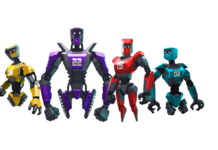VR gaming has created plenty of amusing moments, both in social and solo contexts, but little do many know that it even fosters its own competitive scene. Living well inside of the shadow cast by traditional esports like League of Legends and Overwatch, ‘VR esports’ is a grassroots development—best characterized by its community’s heartfelt enthusiasm toward mixing the active nature of VR gaming with the competitive nature of VR’s most popular game types.
Typically leaning heavily in the direction of PC VR, some of the most popular VR esports are extremely accessible to owners of Oculus Rift, HTC Vive, Valve Index, and even Windows Mixed Reality headsets. While small, teams are already setting down roots and establishing brands. Take it from Tim McGuinness of Team Gravity:
The most prolific titles in the VR esports community, however, are those supported by the ESL.
The VR League, aka the official VR ‘branch’ of the ESL, currently produces championships for four different titles. If you’re interested in getting into the esports side of VR, here are the four titles to watch.
Echo Arena
Echo Arena started as the multiplayer component to Lone Echo, the wildly creative space opera from developer Ready At Dawn that laid the groundwork for zero-g locomotion and ESL-sponsored VR esports tournaments over two years ago. It’s basically competitive frisbee golf between two teams of four players, set in a space arena full of delicately placed obstacles that, when navigated within the game’s zero-g configuration, affords teams with ample opportunity to out-strategize one another while staying active in VR.
Echo Combat
Originally introduced as an expansion pack for Echo Arena, Echo Combat is essentially laser tag with the same locomotion system and architectural philosophy set out in the original game. Each map is designed to force players to adopt different tactics in a fully 3D space, offering a different objective to complement the map’s layout. Echo Combat features a handful of weapons and loadout options to choose from, but don’t expect this game to play like Call of Duty or Halo. This offers very tightly-balanced shooting focused around a few maps, and a lot of different tactics revolving around clever use of zero-g locomotion.
Onward
If you’re looking for straightforward military-style shooting, Onward is the most true-to-form ‘MilSim’ forward-slash ‘tactical shooter’ in all of VR. It’s a bit like Arma, but it’s less about long missions and more about tight skirmishes that last a matter of minutes. Maps are claustrophobic in Onward, but the tension they provide in tandem with the brutally low TTK (time-to-kill) rate make this one of the snappiest competitive shooters you can play in a VR headset.
Space Junkies
Coming straight from Ubisoft Montpellier, Space Junkies is a competitive arena shooter that should feel a bit like Unreal Tournament or Quake 3 Arena in VR, in space, with jetpacks and laser swords. It directly links PC VR and PSVR players together across the Ubisoft network, dubbed the Ubisoft Club. That said, while both groups play together pretty comfortably when matchmaking, it’s unlikely that PSVR and PC VR players will compete formally anytime soon.
Update: It looks like Space Junkies is no longer receiving support by Ubisoft, but the servers will stay open for those who enjoy playing the game. Unfortunately, this means that Space Junkies will probably get switched out of its existing ESL role next season. If you’re interested in continuing to play Space Junkies as an esport, however, you can check out the Space Junkies VR Master League page.
You’re not too late to get into VR esports. While the VR League Season 3 concluded in July, this grouping of games should stay relevant into the next season. If and when the games change, we’ll inform you. Otherwise, which VR game would you like to see included in the ESL next season?











